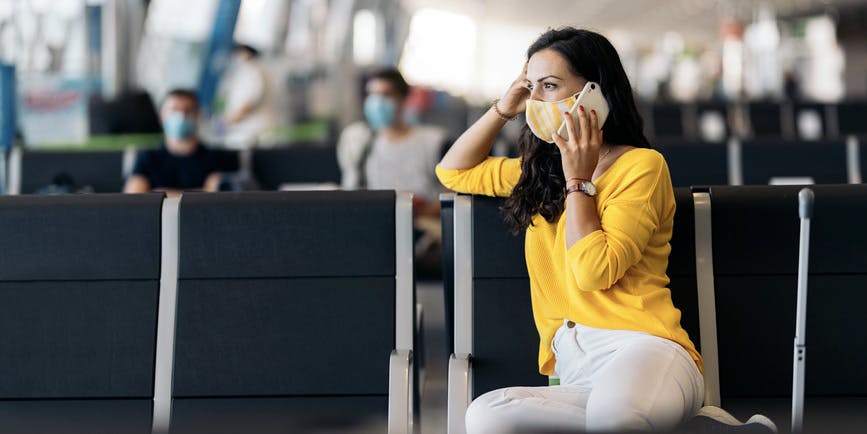
Is diarrhea a symptom of Covid-19?

Topics
Key Points:
- Diarrhea is a common early symptom of Covid-19, along with other GI symptoms like nausea, vomiting and abdominal pain.
- Most cases of diarrhea related to Covid are mild and clear up on their own in a few days.
- Occasionally, some people develop severe diarrhea that requires medical treatment. See your provider if you have diarrhea along with signs of dehydration, a fever over 102° F or if your stool contains blood or pus.
Many people are surprised to learn that gastrointestinal symptoms are one of the most common early signs of Covid-19. But the virus attacks intestinal cells the same way it targets respiratory cells. So, some people experience GI issues like diarrhea, vomiting, nausea and abdominal pain on top of respiratory symptoms.
Here’s what to do if you experience diarrhea as a side effect of Covid-19. Plus, how Dr. B can help those at high risk for severe illness get same-day prescription treatment with a $15 online consultation.
Most common symptoms of Covid-19
Not everyone will experience the same symptoms when they get a Covid-19 infection. And symptoms can differentiate slightly depending on which strain is circulating. But the virus can affect many parts of your body and cause symptoms including:
- Cough
- Fever
- Chills
- Breathing problems
- Muscle or body aches
- Sore throat
- Loss of taste or smell
- Headache
- Congestion or runny nose
- Nausea or vomiting
- Diarrhea
Why does Covid cause diarrhea?
The SARS-CoV-2 virus causes Covid-19. It has a special spike on its surface. The shape of that spike allows it to latch onto a protein on the surface of cells in your body called angiotensin-converting enzyme 2 (ACE 2). When the virus attaches to ACE 2 proteins, it tricks cells into letting it inside.
The respiratory tract is full of cells with ACE 2 proteins. But you can find cells with ACE 2 proteins in the heart, kidneys, reproductive organs and digestive tract. That’s why Covid-19 can cause symptoms in so many different parts of the body.
When Covid-19 attacks cells in the stomach and intestines, it can cause inflammation and tissue damage. It also disrupts the normal gut bacteria that help with digestion. Together, this can lead to symptoms such as diarrhea, abdominal pain, nausea and vomiting.
Is my diarrhea related to Covid-19 or…?
Many different illnesses cause diarrhea. Certain medications can as well—including those used to treat Covid. And some people develop diarrhea from stress and anxiety, which could increase if they’re worried about Covid-19.
Other potential causes of diarrhea include:
- Food poisoning
- Gastroenteritis (stomach flu)
- Medicines including antibiotics, antacids that contain magnesium and antivirals like Paxlovid
- Food intolerances or allergies
- Digestive disorders, like celiac disease or irritable bowel syndrome
How do you know what’s causing your diarrhea? One clue is whether you’re having other symptoms. Covid-19 usually causes additional symptoms like a cough, sore throat or fever.
Talk to your provider if you’re concerned or if your diarrhea is severe or lasts longer than two days. They can take samples of your poop to test for parasites, viruses or bacteria. They can also recommend treatments to avoid dehydration or other complications.
How to manage diarrhea caused by Covid-19
Most cases of diarrhea clear up on their own in a few days. But you can manage diarrhea at home by following these steps:
- Stay hydrated: Drink plenty of fluids, including water, broth and juice. Avoid apple juice, which can make diarrhea worse. Stay away from substances that can cause dehydration, including alcohol and caffeine.
- Stick to bland foods: This includes rice, bananas, applesauce or toast.
- Be gentle on your GI tract: Avoid foods that are hard to digest, including fatty foods, spicy foods, dairy products and high-fiber foods.
- Wash your hands: Washing hands protects others in your household from getting sick.
Talk to your healthcare provider before taking over-the-counter anti-diarrheal medicines (like Loperamide or bismuth subsalicylate). If your diarrhea is caused by bacteria or a parasite, they can make it harder for your body to get rid of the source of the infection.
When to worry about diarrhea
Occasionally, diarrhea can lead to dehydration or other problems. Get help if you’re concerned, or if your symptoms are severe or don’t improve after a few days.
Call your provider right away if you notice:
- Severe abdominal pain or pain in your rectum
- Blood or pus in your poop
- Black or tarry poop
- High fever (over 102° F) along with diarrhea
- Signs of dehydration like weakness, dizziness, dry mouth or skin, extreme thirst, or not peeing much
- Diarrhea lasting more than two days
How dangerous is Covid-19 in 2023?
Most people recover from Covid-19 without any complications. And the Covid-19 vaccine means that fewer people are getting severely sick. But unvaccinated people, those over 50, babies and young children and people with weakened immune systems or some health conditions are more likely to get seriously ill from Covid. Take extra precautions around those people, like testing yourself for Covid-19 before meeting them indoors and wearing a protective mask around them.
Where to find Covid-19 treatment online
If your symptoms are mild and you’re not at high risk for severe illness, recovering from Covid-19 at home is generally safe. But if you’re at high risk and have an active infection, treatment options include Paxlovid and Molnupiravir—antiviral medications by mouth at home.
You need to start these medications within 5 days of your first symptoms. (Earlier is better!) So, if you’re at high risk and have an active infection, come to Dr. B for same-day Covid-19 treatment. We’re available 365 days a year to anyone within the United States. Start a $15 online consultation today!
Sources:
Beyerstedt, S., et. al. (2021). Covid-19: angiotensin-converting enzyme 2 (ACE2) expression and tissue susceptibility to SARS-CoV-2 infection. European Journal of Clinical Microbiology & Infectious Diseases.
Bishehsari, F., et. al.(2022). Gastrointestinal Symptoms Predict the Outcomes From Covid-19 Infection. Journal of Clinical Gastroenterology.
Centers for Disease Control and Prevention. (2023). Symptoms of Covid-19.
Centers for Disease Control and Prevention. (2022). Covid-19 risks and information for older adults.
Chen, A., et. al. (2020). Are gastrointestinal symptoms specific for coronavirus 2019 infection? A prospective case-control study from the United States. Gastroenterology.
Ghimire, S., et. al. (2021). Diarrhea is associated with increased severity of disease in Covid-19: Systemic review and meta-analysis. SN Comprehensive Clinical Medicine.
Megyeri, K. et. al. (2021). Covid-19-associated diarrhea. World Journal of Gastroenterology.
Xu, J., et al. Digestive symptoms of Covid-19 and expression of ACE2 in digestive tract organs. Cell Death Discovery.
Topics
Sign up for the free Dr. B newsletter for a weekly report on the latest in healthcare + research-based advice for staying healthy and mentally well.
Related articles












